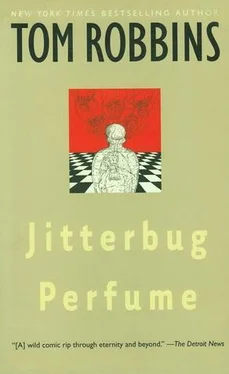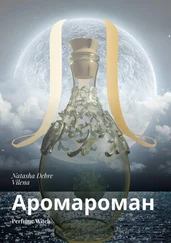The corpse was placed in the middle of the square, upon the pile of logs. The dead man looked comfortable enough, all things considered (it bothered Alobar, philosophically, that the dead invariably seemed more self-possessed than the living), but obviously it only would be a matter of minutes before he began to char like one of those loaves the forgetful Frol was forever leaving too long on the hearth, an image that further hastened Alobar's departure. He had progressed but a few steps, however, before his path was blocked by a procession that, with great pomp, was leading a garlanded woman to the pyre.
As the procession wound around the site, Alobar inquired of a mourner if the woman might be the widow. Hardly had the stranger nodded “yes” than the female moved slowly, but without hesitation, to the “door” of the pyre. A Brahman followed her and handed her one of the torches, with which she lit each corner of the square. Then, to Alobar's horror, she lay down beside her dead husband.
It was with calm resignation, if not dim intelligence, that she at first regarded the flames that darted among the boughs like finches from hell, but when the heat grew more intense and she felt the early bites of pain, she cried out sharply and sat upright in her intended tomb. The Brahmans poked her with the long bamboo poles that they carried to funerals in case a widow should lose her enthusiasm for suicide suttee. A full panic seized her. She brushed the poles aside and made to leap from the square of fire. Using their poles, the Brahmans brought down the roof on her head, but her overheated adrenaline lent her a flash of superhuman strength, and she managed to spring from the blazing pyre and run, her sari smoking, toward the river.
The Brahmans overtook her on the bank and wrestled her back to the pyre, which was now roaring like a furnace. While the woman struggled with the priests, the crowd screamed and yelled. To his surprise, Alobar noticed that he, alone, was cheering for the woman. Under a rash impulse to intervene, he was drawing his knife when three sturdy Brahmans pried her from the earth to which she clung and flung her into the middle of the inferno. She continued to struggle for a minute, parting the heat waves with her shrieks, but by the time Alobar reached the pyre, she was as still and silent as any log in the blaze.
Shoving jabbering mourners roughly aside, holding his nose against the cannibal recipes that were pasting themselves in the air; scattering lotus garlands, hibiscus wreaths, rice balls, and milk bowls with kicks from what little was left of his boots, he barreled from the funeral grounds with an elephant's drive, and nothing, not Brahmanic curses nor the starched curtain of heat nor the craters and clouds of red dust in the road slowed him down. He might have continued at that pace for miles had he not come alongside a small girl, who was also fleeing the scene, sobbing hysterically.
Alobar put his arm around the child and tried to comfort her. From the rags of his blanket roll, he fished a piece of honeyed coconut meat that he had been saving for his bedtime treat. The girl refused it, though her sobs subsided somewhat, and she rested her head against his side. When they reached a leafy mango tree, out of sight of hair smoke and lip ash and bowel cinders, Alobar sat her down, dried her tears, and sang for her his ditty about the world being, against all evidence, round. She took the sweet.
Between bites, the child explained that she was unrelated to the funeral party but had come upon it by chance in the course of running a family errand. Thereupon she opened her basket and revealed its contents: a dozen round and ruddy roots, caked with loam.
“Beets!” cried Alobar. “Aren't you the lucky one?” He smacked his lips. “You shall dine handsomely this night.”
The girl made a face. “Nobody eats these ugly things,” she said. She went on to tell how her family boiled down beets for the color that was in them. Her father had dispatched her to gather this batch so that he might dye the strips of cotton cloth in which he wrapped the aromatic cones and sticks that he made and sold. She had been born, eight years earlier, into a caste of incense makers, and since business was flourishing at the holy sites along the Ganges where pilgrims bathed, and since she had but one brother, she was frequently called away from household chores in order to help in the trade.
“Dye,” grumbled Alobar. “A tragic waste of fine food.” But his lament was short-lived. There was something about the girl more interesting than her beet basket. She was a miniature version of Wren! The longer Alobar looked at her, the stronger the feeling. Her eyelids, like Wren's, were as thick and languid as the peel of some pulpy fruit; she had the same chin dimple: a wormhole in a pear; the same occupied codpiece for a nose. As did Wren's, her lips parted reluctantly, like waters protecting an oyster bed, to slowly disclose the aquatic shelf of bright teeth behind them, and in the girl's eyes there fluttered illuminated parchments upon which intelligent things were written, things that Alobar could scarcely hope to read. She was two or three shades darker, and several sizes smaller, naturally, but he could not help but call her Wren, his little Wrenna, unaware that his wife had been murdered by the jealous necromancer Noog a few weeks after Alobar was carried feet-first from his citadel eight years before.
“My name is Kudra,” said the child. “Kudra, not Wren, and I believe I must go now.”
“Yes, you must,” agreed Alobar, who was ashamed and alarmed at the way his cock was beginning to push against the folds of its tent. “I, too, must resume my trek.” He pointed to the north, in whose far mountains there supposedly dwelt the teachers he had long been seeking, the masters over death. He related to Kudra only a modicum of his travel plans, but she was to remember them in times to come, just as she was to remember his parting testimony in praise of the edibility of beets and as she was to remember how he had turned and run after her, grasped her shoulders and made her promise, through a fresh outpouring of tears, that what had transpired with the widow at the pyre that day would never transpire with her. .
“Bones are patient. Bones never tire nor do they run away. When you come upon a man who has been dead many years, his bones will still be lying there, in place, content, patiently waiting, but his flesh will have gotten up and left him. Water is like flesh. Water will not stand still. It is always off to somewhere else; restless, talkative, and curious. Even water in a covered jar will disappear in time. Flesh is water. Stones are like bones. Satisfied. Patient. Dependable. Tell me, then, Alobar, in order to achieve immortality, should you emulate water or stone? Should you trust your flesh or your bones?”
Alobar had stared at the lama and said nothing. After several minutes, the lama had asked him why he remained silent. “Water babbles to stone,” said Alobar, “but stone will not answer.”
From then on, they showed him some respect.
When Kudra revealed herself to him at the river, Alobar dressed quickly and led her away. “Where are you going with that boy?” called the lama. “Come back here! We have many stones to move.”
“Stones are patient,” Alobar replied. “I thought you knew.”
They climbed from the riverbed to a grassy outcropping, where they might find a bit of padding for their backsides and perhaps watch the mountains vying with one another to see who could be tallest. Chomolungma was winning. Chomolungma was what the world looked like when the world stood on tiptoes. Pale from the strain, blue from the lack of oxygen. The vegetation had all grown dizzy and slid down her back, snow swirled in perpetual spirals around her skull, she wore a glacier in her crotch like a sanitary napkin.
Читать дальше












